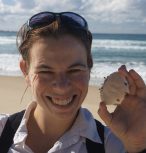DNA reveals the past and future of coral reefs
New DNA techniques are being used to understand how coral reacted to the end of the last ice age in order to better predict how they will cope with current changes to the climate. James Cook Univer

From 2005 to 2022, the main node of the ARC Centre of Excellence for Coral Reef Studies was headquartered at James Cook University in Townsville, Queensland (Australia)








Abstract. Mass mortality of several mollusc species occurs regularly in the summer months in natural and cultured environments worldwide. Termed ‘summer mortality,’ this condition is known to impact a range of species including Pacific oysters, scallops and abalone. Mortality due to the disease can be catastrophic with deaths of up to 80% of a population reported. Summer mortality does not appear to have a simple cause, but rather results from complex interactions between the species, opportunistic pathogens and environmental stress, particularly elevated water temperatures. It is expected that rising ocean temperatures due to global climate change will lead to an increase in incidence of the disease. Fortunately, genetic resilience to summer mortality has been demonstrated among individuals in some mollusc species. In order to understand the defining signatures and functional mechanisms involved in summer mortality survival, we analysed the gene expression profiles of greenlip abalone (Haliotis laevigata) determined to be susceptible and resilient to a summer mortality event both prior to and throughout a temperature spike. Significantly differentially expressed genes were detected between susceptible and resilient abalone both during the trial and remarkably six months prior to the heat stress event. The genetic mechanisms that abalone use to combat summer mortality will be presented along with data investigating the relationship to abalone movement, source location and feed type.
Biography. Jan completed her BSc (Hons) at JCU in 1999 before obtaining her DPhil at Oxford University, UK in 2005. During her DPhil she used molecular and fossil evidence to investigate phylogenetic relationships and divergence times within cephalopods (octopus, squids and cuttlefish). Jan then worked as a postdoctoral research fellow at Queen’s University, Belfast, the British Antarctic Survey and Cambridge University UK, where she investigated evolutionary relationships within and between Antarctic and deep-sea octopods. She reported the first dated molecular evidence that deep-sea fauna from other ocean basins originated from Southern Ocean taxa. Jan returned to the Department of Marine Biology and Aquaculture at JCU in 2016. Her current projects include ARC funded research where she employs genomic and proteomic techniques to address a diverse range of questions about the evolution of marine species. Currently her laboratory group is investigating population differentiation, recruitment and adaptation in a range of commercially important lobster species. They also work on marine species that are shifting range in response to climate change and are investigating the genetic basis for resilience and susceptibility to temperature stress in abalone.
New DNA techniques are being used to understand how coral reacted to the end of the last ice age in order to better predict how they will cope with current changes to the climate. James Cook Univer
A new study on the effects of climate change in five tropical countries has found fisheries are in more trouble than agriculture, and poor people are in the most danger. Distinguished Profess
James Cook University researchers have found brightly coloured fish are becoming increasingly rare as coral declines, with the phenomenon likely to get worse in the future. Christopher Hemingson, a
Researchers working with stakeholders in the Great Barrier Reef region have come up with ideas on how groups responsible for looking after the reef can operate more effectively when the next bleaching
Abstract: As marine species adapt to climate change, their heat tolerance will likely be under strong selection. Individual variation in heat tolerance and its heritability underpin the potential fo
Abstract: The Reef Ecology Lab in KAUST’s Red Sea Research Center explores many aspects of movement ecology of marine organisms, ranging from adult migrations to intergenerational larval dispersal
Abstract: Macroalgal meadows are a prominent, yet often maligned component of the tropical seascape. Our work at Ningaloo reef in WA demonstrate that canopy forming macroalgae provide habitat for ad
Abstract: Sharks are generally perceived as strong and fearsome animals. With fossils dating back at least 420 million years, sharks are not only majestic top predators but they also outlived dinosa
Abstract: Connectivity plays a vital role in many ecosystems through its effects on fundamental ecological and evolutionary processes. Its consequences for populations and metapopulations have been
Abstract: Evolution of many eukaryotic organisms is affected by interactions with microbes. Microbial symbioses can ultimately reflect host’s diet, habitat range, and even body shape. However, how
Abstract: The past few years have seen unprecedented coral bleaching and mortality on the Great Barrier Reef (GBR) but the consequences of this on biodiversity are not yet known. This talk will expl